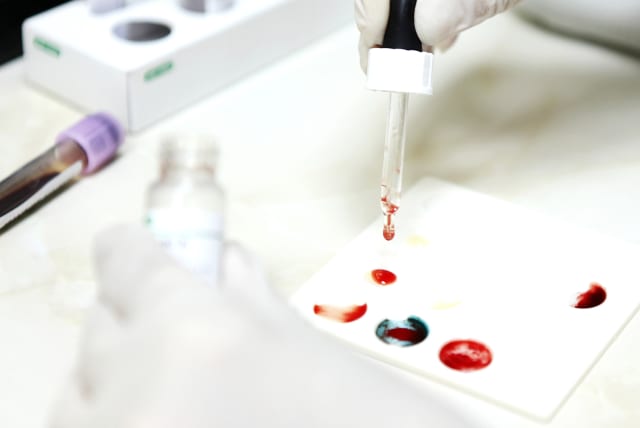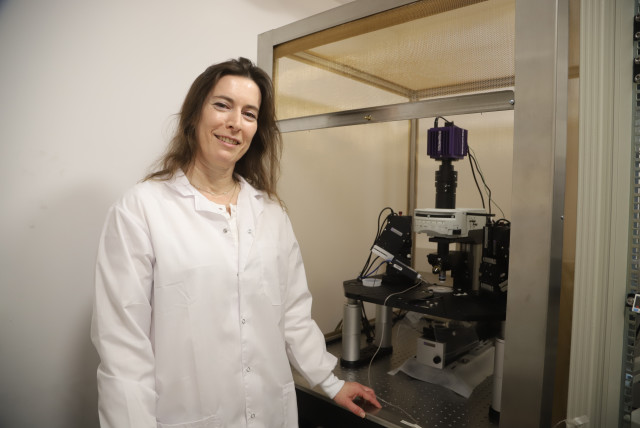New Israeli blood test can diagnose bipolar disorder - study

The blood test, made by researchers at Israel's University of Haifa, can identify peopl coping with bipolar disorder and help figure out what medications are needed for treatment.
A simple blood test developed by the University of Haifa neurobiologists can identify people coping with bipolar disorder (formerly known as manic depression) and predict the efficacy of lithium – the drug given to patients with this disorder. It is quite common, with one in every 100 adults diagnosed with it at some point in their life. It can appear at any age, but it often develops between the ages of 15 and 19 and rarely after 40.
Bipolar disorder is a psychiatric illness that causes unusual shifts in a person's mood, energy, activity levels, and concentration. These shifts can make it difficult to carry out day-to-day tasks.
The manic phase can include feeling full of energy, self-important, very happy, elated, or overjoyed; talking very quickly; feeling full of great new ideas and having important plans; being easily distracted, irritated, or agitated.
People with bipolar disorder experience dramatic shifts in mood that may include periods of depression and mania, but it doesn’t involve only mood swings. The nature and severity of these symptoms depend on the type of bipolar disorder that they have. Bipolar I affects people who experience at least one manic episode in their lives. Although not required for the formal diagnosis, the vast majority will also experience major depressive episodes during the course of their lives.
Bipolar II involves at least one hypomanic episode (a less serious form of mania) and at least one major depressive episode.
Symptoms of a manic or hypomanic episode include being easily distracted; having a reduced need for sleep, decreased need for sleep delusions or hallucinations, an elevated mood; inappropriate behavior; impulsive risk behaviors (including gambling and lavish spending); increased sexual desire; irritability, hostility, or aggression; physical agitation and relentless movement; racing thoughts; and excessive talking. The episodes last for at least a week. Manic episodes last at least seven days.
Hypomanic episodes involve the same symptoms, but the individual's functioning isn't markedly impaired and there are no psychotic symptoms.
During a depressive episode, a sufferer may cry for no reason, have prolonged periods of sadness, extreme fatigue including being unwilling to get out of bed; difficulty concentrating or deciding, feelings of guilt or hopelessness, loss of interest in things that used to give him pleasure; difficulty sleeping or sleeping too much; no reason or prolonged periods of sadness; difficulty concentrating or indecisiveness; loss of interest in health, nutrition, or physical appearance; and suicidal thoughts or an impulse to self-harm. There are also numerous physical changes like yo-yo gaining or losing weight.
The study has just been published in the prestigious journal Molecular Psychiatry, which is part of the Nature group, under the title “Immunoglobulin genes expressed in lymphoblastoid cell lines discern and predict lithium response in bipolar disorder patients.”
How can you diagnose bipolar disorder with a blood test?
Not only can the test diagnose bipolar within only a few days and at a relatively low cost, but it can also predict the efficacy of lithium allowing psychiatrists to adjust the medication individually, explained the university’s Dr. Shani Stern, who was the corresponding author of the study.
Her research team included research students Liron Mizrahi and Ashwani Choudhary from the University of Haifa’s Sagol Department of Neurobiology, in collaboration with Dalhousie University in Halifax in Canada and the Salk Institute in La Jolla, California.
Stern noted that due to the strong similarity between manic depression and other disorders like schizophrenia, there is a risk of misdiagnosis, at least in the early stages. There also has been no way to know in advance whether or not lithium will help an individual patient.
The study sought to examine whether it is possible to use a blood test to identify a person suffering from bipolar disorder and to predict the efficacy of lithium treatment for that individual. The study examined cells from three different groups in the population: people who are not suffering from bipolar disorder; people who are suffering from bipolar disorder and who respond to lithium treatment; and people suffering from the disorder who do not respond to lithium.
Stern’s lab uses molecular biology combined with biophysical, electrophysiological, and numerical simulation platforms to facilitate the use of induced pluripotent stem cell technologies, where adult cells from human patients are reprogrammed into pluripotent stem cells. The derived human neurons have the same genetics as the patients and are therefore an excellent model for studying human brain disease and disorders. The lab focuses on bipolar disorder, Parkinson’s disease and rare mutations that cause intellectual disability, epilepsy, and autism. By understanding the mechanisms that underly these disorders, the lab seeks to develop precision medicine programs and find biomarkers for better diagnosis and improved prognosis of disease.
In the study’s first stage, white blood cells isolated from all the participants were examined; a cell culture is produced that can be maintained for a long period by infecting the cells with the Epstein-Barr virus (of the herpes family) that causes mononucleosis. In the second stage, the researchers extracted RNA from the cells to understand which genes are expressed in each population and to identify genes that are expressed differentially.
The findings showed that 80% of the differences in gene expression are related to the expression of immunoglobins, the chief components of the immune system. “The most significant finding is that in people suffering from bipolar disorder, a difference was found at the expression level of genes of the receptors to the antibodies; this may explain the high rate of comorbidities. There is a known correlation between various psychiatric disorders and ancillary morbidity,” Stern noted.
After obtaining the biological findings, the researchers used a model based on artificial intelligence comprising neural networks; the AI model was developed at Stern’s laboratory for verifying the findings. The researchers also used cells from other laboratories that executed the same biological processes as in the new study to validate that the computational model also works for cells sampled in various laboratories.
The findings of the mathematical model were capable of predicting at a level of precision of over 90% if a person suffers from bipolar disorder and whether they respond to lithium treatment. “This method can enable people coping with psychiatric disorders to save many months of suffering by adjusting the right medication for them,” Stern concluded.
Jerusalem Post Store
`; document.getElementById("linkPremium").innerHTML = cont; var divWithLink = document.getElementById("premium-link"); if (divWithLink !== null && divWithLink !== 'undefined') { divWithLink.style.border = "solid 1px #cb0f3e"; divWithLink.style.textAlign = "center"; divWithLink.style.marginBottom = "15px"; divWithLink.style.marginTop = "15px"; divWithLink.style.width = "100%"; divWithLink.style.backgroundColor = "#122952"; divWithLink.style.color = "#ffffff"; divWithLink.style.lineHeight = "1.5"; } } (function (v, i) { });

